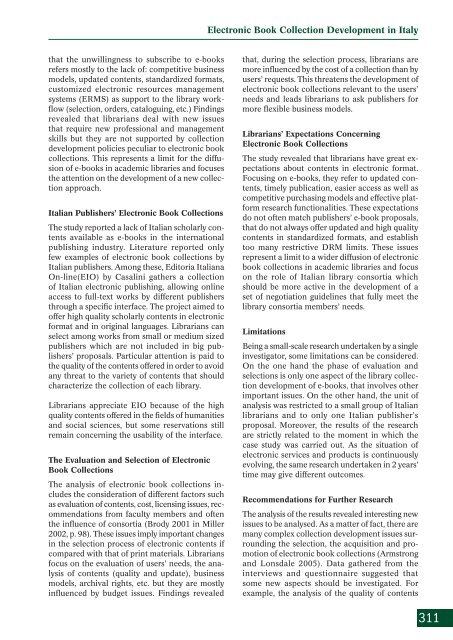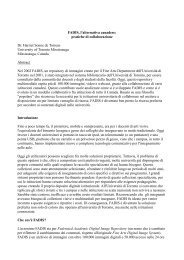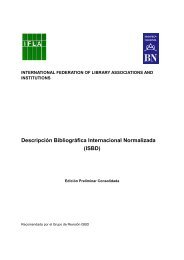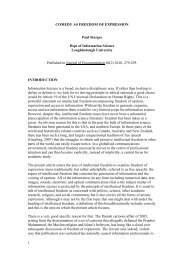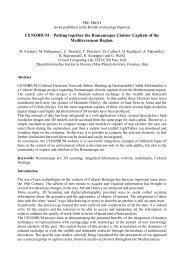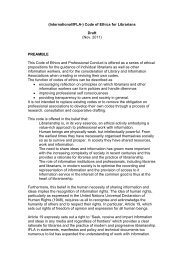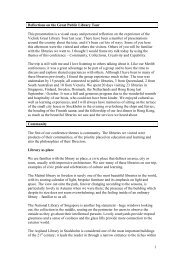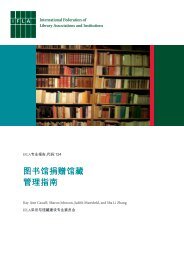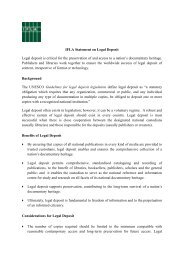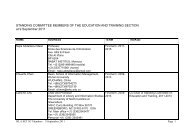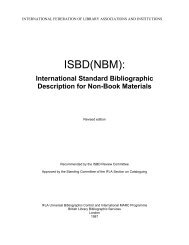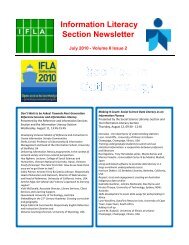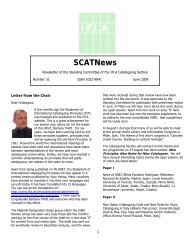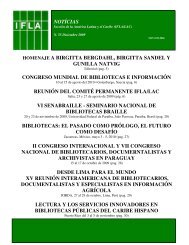World Library and Information Congress, Milan, 2009 - IFLA
World Library and Information Congress, Milan, 2009 - IFLA
World Library and Information Congress, Milan, 2009 - IFLA
You also want an ePaper? Increase the reach of your titles
YUMPU automatically turns print PDFs into web optimized ePapers that Google loves.
that the unwillingness to subscribe to e-books<br />
refers mostly to the lack of: competitive business<br />
models, updated contents, st<strong>and</strong>ardized formats,<br />
customized electronic resources management<br />
systems (ERMS) as support to the library workfl<br />
ow (selection, orders, cataloguing, etc.) Findings<br />
revealed that librarians deal with new issues<br />
that require new professional <strong>and</strong> management<br />
skills but they are not supported by collection<br />
development policies peculiar to electronic book<br />
collections. This represents a limit for the diffusion<br />
of e-books in academic libraries <strong>and</strong> focuses<br />
the attention on the development of a new collection<br />
approach.<br />
Italian Publishers’ Electronic Book Collections<br />
The study reported a lack of Italian scholarly contents<br />
available as e-books in the international<br />
publishing industry. Literature reported only<br />
few examples of electronic book collections by<br />
Italian publishers. Among these, Editoria Italiana<br />
On-line(EIO) by Casalini gathers a collection<br />
of Italian electronic publishing, allowing online<br />
access to full-text works by different publishers<br />
through a specifi c interface. The project aimed to<br />
offer high quality scholarly contents in electronic<br />
format <strong>and</strong> in original languages. Librarians can<br />
select among works from small or medium sized<br />
publishers which are not included in big publishers’<br />
proposals. Particular attention is paid to<br />
the quality of the contents offered in order to avoid<br />
any threat to the variety of contents that should<br />
characterize the collection of each library.<br />
Librarians appreciate EIO because of the high<br />
quality contents offered in the fi elds of humanities<br />
<strong>and</strong> social sciences, but some reservations still<br />
remain concerning the usability of the interface.<br />
The Evaluation <strong>and</strong> Selection of Electronic<br />
Book Collections<br />
The analysis of electronic book collections includes<br />
the consideration of different factors such<br />
as evaluation of contents, cost, licensing issues, recommendations<br />
from faculty members <strong>and</strong> often<br />
the infl uence of consortia (Brody 2001 in Miller<br />
2002, p. 98). These issues imply important changes<br />
in the selection process of electronic contents if<br />
compared with that of print materials. Librarians<br />
focus on the evaluation of users’ needs, the analysis<br />
of contents (quality <strong>and</strong> update), business<br />
models, archival rights, etc. but they are mostly<br />
infl uenced by budget issues. Findings revealed<br />
Electronic Book Collection Development in Italy<br />
that, during the selection process, librarians are<br />
more infl uenced by the cost of a collection than by<br />
users’ requests. This threatens the development of<br />
electronic book collections relevant to the users’<br />
needs <strong>and</strong> leads librarians to ask publishers for<br />
more fl exible business models.<br />
Librarians’ Expectations Concerning<br />
Electronic Book Collections<br />
The study revealed that librarians have great expectations<br />
about contents in electronic format.<br />
Focusing on e-books, they refer to updated contents,<br />
timely publication, easier access as well as<br />
competitive purchasing models <strong>and</strong> effective platform<br />
research functionalities. These expectations<br />
do not often match publishers’ e-book proposals,<br />
that do not always offer updated <strong>and</strong> high quality<br />
contents in st<strong>and</strong>ardized formats, <strong>and</strong> establish<br />
too many restrictive DRM limits. These issues<br />
represent a limit to a wider diffusion of electronic<br />
book collections in academic libraries <strong>and</strong> focus<br />
on the role of Italian library consortia which<br />
should be more active in the development of a<br />
set of negotiation guidelines that fully meet the<br />
library consortia members’ needs.<br />
Limitations<br />
Being a small-scale research undertaken by a single<br />
investigator, some limitations can be considered.<br />
On the one h<strong>and</strong> the phase of evaluation <strong>and</strong><br />
selections is only one aspect of the library collection<br />
development of e-books, that involves other<br />
important issues. On the other h<strong>and</strong>, the unit of<br />
analysis was restricted to a small group of Italian<br />
librarians <strong>and</strong> to only one Italian publisher’s<br />
proposal. Moreover, the results of the research<br />
are strictly related to the moment in which the<br />
case study was carried out. As the situation of<br />
electronic services <strong>and</strong> products is continuously<br />
evolving, the same research undertaken in 2 years’<br />
time may give different outcomes.<br />
Recommendations for Further Research<br />
The analysis of the results revealed interesting new<br />
issues to be analysed. As a matter of fact, there are<br />
many complex collection development issues surrounding<br />
the selection, the acquisition <strong>and</strong> promotion<br />
of electronic book collections (Armstrong<br />
<strong>and</strong> Lonsdale 2005). Data gathered from the<br />
interviews <strong>and</strong> questionnaire suggested that<br />
some new aspects should be investigated. For<br />
example, the analysis of the quality of contents<br />
311


